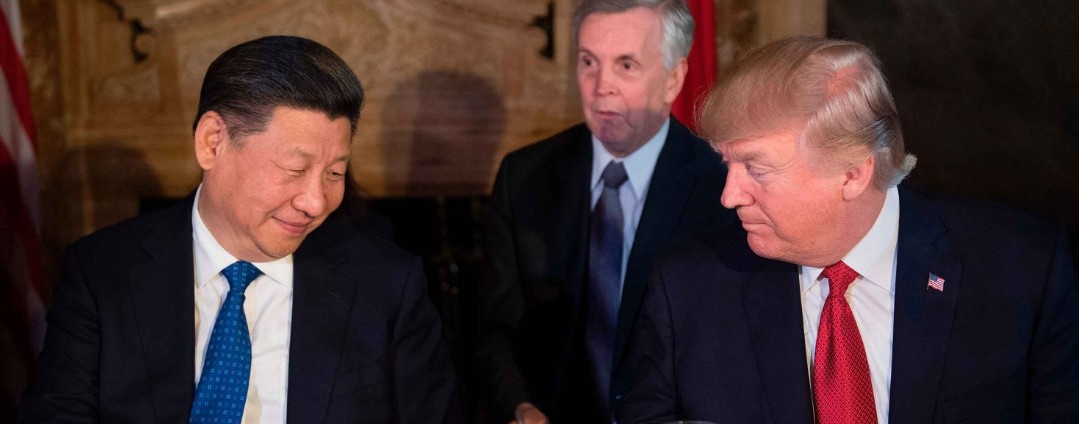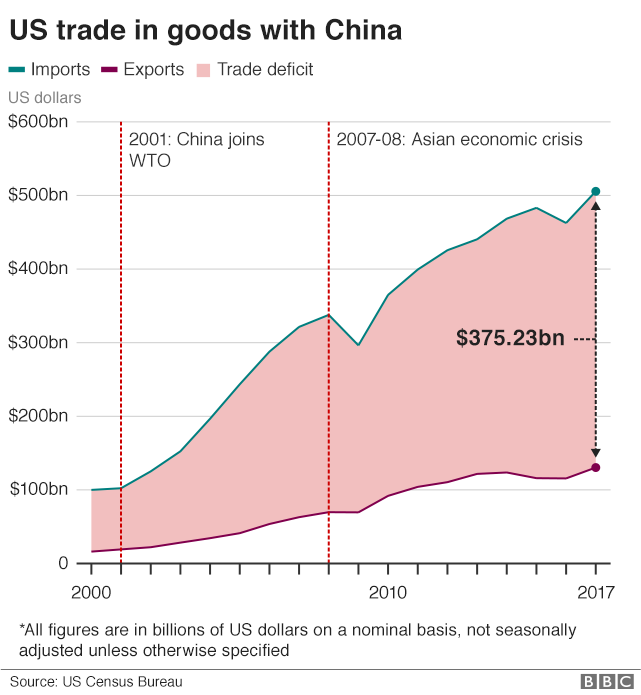Consequences of China-US trade wars
March 24, 2018 | Expert Insights

China has announced plans for reciprocal tariffs against the US worth $3 billion. As fears about a potential trade war continues to grow, the Asian stock market has witnessed a decline.
Background
China is a major market for US agricultural products, machinery, and cars as well as other products. In 2016, it was the third largest market for US exports. According to the American Apparel & Footwear Association, more than 41% of clothing and 72% of footwear sold in the US are made in China.
“US-China bilateral trade investment ties are integrated with global supply chains. So a US-China trade war is necessarily going to have an effect on companies and consumers in other countries,” said Scott Kennedy, an expert on Chinese economic policy at the Center for Strategic and International Studies in Washington.
The United States and China are two of the largest economies in the world. Each considers the other as a partner in trade and an adversary in geopolitics. US President Donald Trump has previously been a critic of China. He blamed the country for loss of jobs within the US and has often criticized the US trade deficit with China. China's trade surplus with the United States widened in 2017 while total foreign trade volume maintained rapid growth.
Former chief executive of Hong Kong Tung Chee-hwa recently said that a trade war must be avoided. “In such a big relationship, there is bound to be disagreement, but rash action on either side will only create the environment for a very serious trade war, which is not good for any country. Patient discussion and negotiation, particularly considering the long-term prospects of the relationship, will be very important,” he said.

Analysis
US President Donald Trump’s announcement of tariffs on US$60 billion worth of Chinese imports last week raised the prospect of a trade war, which is expected to threaten the global economy. The upcoming trade sanctions have triggered retaliation from China’s foreign ministry, which said that Beijing would “take all legal measures to protect our interest.”
On March 23rd 2018, China unveiled tariffs on $3 billion of US imports as a response to the US’ actions. “China’s response is surprisingly modest in the light of the US actions, suggesting there could be a good deal more to come,” said Stephen Roach, a former non-executive chairman for Morgan Stanley in Asia and now a senior fellow at Yale University. “As America’s third largest and most rapidly growing export market and as the largest foreign owner of Treasuries, China has considerably more leverage over the U.S. than Washington politicians care to admit.”
In addition to these tariffs, it has been reported that China will take up legal action against the US at the World Trade Organization. Experts have noted that China’s response is restrained. “The US declared a trade war, but China is acting quite restrained. The list that China has announced appears to be a retaliation, but still it is very measured," said Li Yong, senior fellow of China Association of International Trade. "The move sends a message that China is able to fight back, but we still want a trade peace instead of a trade war."
Fears continue to grow, of a trade war between the two countries that could ultimately affect the global economy. Asian shares declined amid these concerns - Japan's Nikkei 225 index fell 4.5% and the Shanghai Composite fell 3.6%.
"Equity markets have sold-off heavily this morning as investors are fearful we are entering a trade war," said David Maddon, market analyst at CMC Markets UK. "Traders don't like the look of the political landscape, and they are seeking safe-haven assets."
The US has already launched a formal complaint against China at the WTO. Its statement said: “China appears to be breaking WTO rules by denying foreign patent holders, including US companies, basic patent rights to stop a Chinese entity from using the technology after a licensing contract ends. China also appears to be breaking WTO rules by imposing mandatory adverse contract terms that discriminate against and are less favourable for imported foreign technology.”
China’s ministry has noted, “China will not sit idly by its own legitimate rights and interests. We are fully prepared to defend our legitimate interests.”
“This has been long in the making,” Trump said signing the intellectual-property order, adding that the tariffs could affect as much as $60 billion in goods. He told reporters, “This is the first of many.”
Assessment
Our assessment is that markets remain concerned about the potential of an escalated trade war between China and the US. In addition, these tariffs have other consequences as well. According to analysts, the tariffs imposed by the US would result in higher costs for consumers. The tariffs imposed by China would negatively hit US agriculture and aerospace industries.
Read more: Is trade war inevitable?








Comments